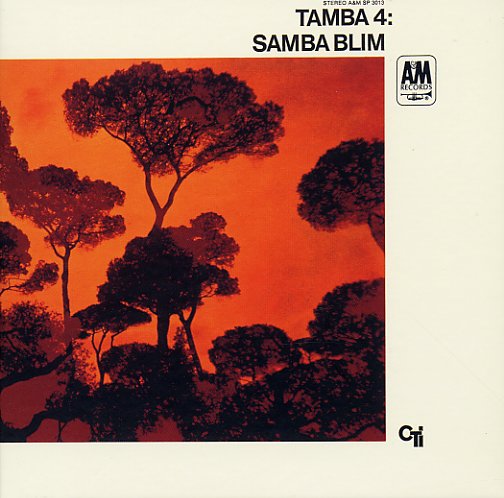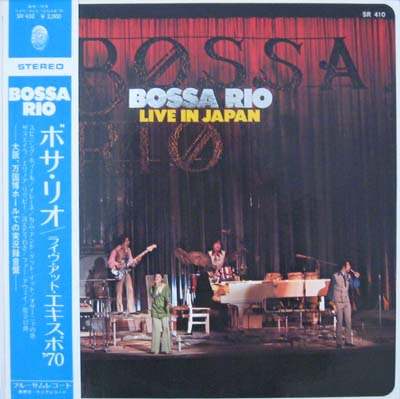 There's Baile Funk, Samba Funk, Funky Samba, Brazilian Soul, Roots Samba, Bossa Nova and dozens more sub-genres of Brazilian music that swing, but today we're gonna focus on just that, the SWING. In Brazilian Portuguese, the term is "Balanço". Now, there's no real specific definition of "Balanço" but like the term suggests, its more a feeling, the way a song moves. I think this term became popularized in the early-to-mid sixties when the instrumental Bossa Jazz trios were in swinging in full fore, such as Tamba Trio, Jongo Trio, Bossa Três and many others. These groups were melodic, but they also SWUNG HARD.
There's Baile Funk, Samba Funk, Funky Samba, Brazilian Soul, Roots Samba, Bossa Nova and dozens more sub-genres of Brazilian music that swing, but today we're gonna focus on just that, the SWING. In Brazilian Portuguese, the term is "Balanço". Now, there's no real specific definition of "Balanço" but like the term suggests, its more a feeling, the way a song moves. I think this term became popularized in the early-to-mid sixties when the instrumental Bossa Jazz trios were in swinging in full fore, such as Tamba Trio, Jongo Trio, Bossa Três and many others. These groups were melodic, but they also SWUNG HARD. Around this time you also have "dance music" purveyors, like Ed Lincoln with his organ and his swinging dance records. One of Ed's main men and occasional vocalist was Orlandivo, who first started recording in the early 60s. He made a couple albums in the early-to-mid sixties and then not another solo record until the 1977 album he did with João Donato (see below). He was a vocalist, percussionist and song writer.
 One of Orlandivo's best known songs is featured today in four versions, "Tamanco No Samba". The direct translation means "Clog in Samba", but clog like the wooden shoe, not what's backing up your drain. If someone knows what this is referring to, please chime in. A quick glance at the lyrics suggests the song is about the sound a woman makes when dancing the samba wearing clogs - a bonus percussive element to the samba. Works for me.
One of Orlandivo's best known songs is featured today in four versions, "Tamanco No Samba". The direct translation means "Clog in Samba", but clog like the wooden shoe, not what's backing up your drain. If someone knows what this is referring to, please chime in. A quick glance at the lyrics suggests the song is about the sound a woman makes when dancing the samba wearing clogs - a bonus percussive element to the samba. Works for me.Anyways, this is a sleeper favorite from Orlandivo's 1977 album, which is chock full of great tunes and then I found it retitled as "Samba Blim" from the Tamba 4 album of the same name on A&M from 1968. The drummer from Tamba 4, Helcio Milito, often appears alongside Orlandivo on various album credits throughout the years, so I'm guessing they go way back. Next, I heard another cover on the beautiful 70s bossa vocal jazz album Aquarius and then my main man Cal Tjader covered the tune with help from Airto on his "Amazonas" album. And with that, I bring you "Tamanco No Samba."
 Tamba 4 - Samba Blim
Tamba 4 - Samba BlimI picked up their first A&M album "We and the Sea" awhile back but it was when my initial bossa binge was waning, so I failed to appreciate this top-shelf band making full use of the American recording environment. This, their second and final record for A&M (though rumors have it there was a third recorded - the promo single only "California Soul" being from those sessions) is really solid. They were such a versatile band for three (occasionally four) members including the singing bassist, Bebeto. I discovered this tune after knowing and loving the 1977 Orlandivo version and realized it was the same song with a different title, which was not uncommon for US releases of Brazilian tunes.
 Aquarius - Tamanco No Samba
Aquarius - Tamanco No SambaThis is an extremely rare record that has more than a little in common with the criminally underrated duo of Burnier & Cartier. Cartier is absent on this one, but Octavio Burner and his wife Sonia are all over this and the sound is very similar to their albums and then there are two of their compositions on here. Overall, this is a lovely mid-seventies Bossa Nova album with stunning production. You can download it here from Quimsy's blog.
 Orlandivo - Tamanco No Samba
Orlandivo - Tamanco No SambaOne of the best albums of the 70s for my money. Orlandivo's songs and laid-back vocal style combined with a top-shelf band including João Donato on arrangements. Loronix has the album here.
 Cal Tjader - Tamanco No Samba
Cal Tjader - Tamanco No SambaCal knew his Brazilian music and on top of that he had Airto produce this mid-seventies outing so you knew he was gonna have the Brazilian beat dialed in to perfection. This joint was recorded walking distance from where I work in Berkeley, CA.













.jpg)



.jpg)









